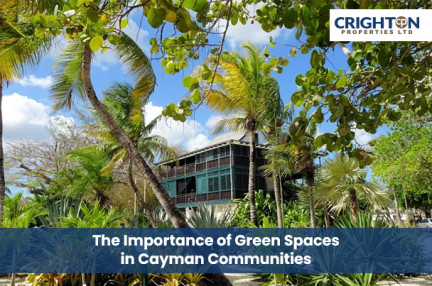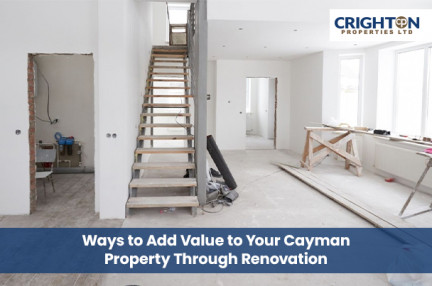
How Coastal Conditions Influence Architecture in Cayman
Discover how coastal conditions in the Cayman Islands shape architectural design, from hurricane resistance to ventilation and elevated foundations.
Crighton Properties | April 22, 2024
Renovating or building a new home can be a significant decision for property owners in the Cayman Islands. Each option comes with its own set of advantages and disadvantages, making it crucial to weigh all factors carefully before proceeding.
Through this write-up, let's explore the pros and cons of renovating and building a new home to help you make an informed decision.
Preservation of the Architecture: Revamping an already constructed property allows homeowners to add a personalized touch to their space while preserving its charm. This is a wonderful way, especially if your home has historical significance.
Various properties in Cayman showcase inspiring architectural features, and remodeling them in your style while sustaining their originality can help you maintain their character.
Cost-Effective Solution: Are you wondering whether to renovate or build a new home in Cayman? Remodeling has always been more budget-friendly than developing a home.
However, spending money on a damaged property doesn’t always show a satisfactory outcome, especially with underlying issues. Moreover, renovation is a time & labor-consuming process, and unwanted complications can delay the completion timelines, leading you to invest more than expected.
Renovation is a perfect solution for Cayman property owners on a budget or who don’t want to invest huge capital.
Faster Completion: Revamping typically has shorter timelines compared to new construction. Since the basic structure already exists, it may require less time to plan and get the development permit, allowing property owners to move into the space sooner.
Environmental Impact: Renovating an existing home can be more environmentally friendly than building a new one. Reusing materials and structures reduces resource demand and minimizes construction waste, contributing to sustainability efforts.
Sustainable Efforts: You can also build a healthier and energy-efficient environment by installing insulated windows and HVAC systems. Other sustainable practices include taking conservation measures using water-saving technologies like faucets, flushes, and showerheads.
Location Benefits: Unlike building a new home, where you have to search for a friendly and well-maintained neighborhood with reliable infrastructure and amenities, renovating a home in an existing neighborhood allows you to remain a part of a community that you know and love.
Neither do you have to worry about structural issues since you already have an idea of how strong they are, nor face the hassle of shifting to a new space. All in all, renovation not only enhances your aesthetics but also your quality of life.
Unexpected Issues: One of the most common drawbacks of renovating an existing home is you have a high chance of running into unwanted issues. Troubles such as damaged plumbing systems, outdated electrical wiring, structural defects, or compliance complexities with building codes can not only extend the project timeline but also significantly increase the overall cost of refurbishing.
Design Limitations: In comparison to building a new home where you get complete freedom of customizing your space to your vision, renovating an existing property might pose hurdles in design and layout to meet modern standards.
Irregular room shapes, space limitations, compatibility of new features with the old, non-compliant building codes, etc, can act as a barrier in the journey, resulting in delay and an unsatisfactory outcome.
Maintenance Issues: One of the biggest cons of renovating a home is upkeep. Renovation is not merely about painting the walls, repairing the visible damage, and replacing the furniture; you have to focus on inherent structural issues, outdated or faulty wiring, plumbing problems, HVAC systems, insulation & weatherproofing, and exterior maintenance.
Neglecting or postponing major maintenance can damage your property, decrease its value, and increase repair costs down the line, as well as raise safety concerns.
Less Energy Saving: While a few properties and residential buildings are compatible with the new age energy-efficient systems, many homes are not designed to fit today’s parameters, which include renewable power generating solutions, water conservation, smart home technology, etc.
All these factors can elevate utility expenses and negatively impact the environment.
Custom Design: The most wonderful aspect of constructing a new residence is that you can personalize and make the most out of your surroundings. This ultimate opportunity becomes even more incredible when you enjoy creating the space of your dreams.
From sketching out your vision to selecting high-quality materials, choosing a range of skilled craftsmen, and handpicking the most captivating pieces of furniture and decor elements, this process allows you to create a home that is uniquely yours while offering a sense of accomplishment and building an emotional connection.
Modern Amenities: Apart from customization, you can easily incorporate exclusive amenities in a new home. Whether you want to give a luxurious spa-like feel to your bathroom with a soaking tub, steam shower, and ambient lighting or install entertainment systems and smart thermostats in your living room, there are endless possibilities to enhance your lifestyle.
Future Appreciation: Another advantage of a newly built property is that you can make profitable returns in the future. Of course, other factors contribute to the value appreciation, but quality construction with aesthetics, advanced features, and facilities makes a property desirable and high in demand, resulting in upward pricing.
Energy Efficiency: Recently developed homes play a significant role in energy efficiency. You can seamlessly equip innovative technologies such as solar panels, HVAC systems, smart appliances, and more in your residency, which not only helps save on energy costs but also natural habitat.
Higher Upfront Expenses: The biggest drawback of constructing a new home is that you must take care of multiple expenses, which are relatively higher than renovation. You have to spend on architects, labor, land, amenities, and so much more to complete the project successfully.
Extended Timeline: Another downside of developing a home from scratch is that you must actively participate in the building phase for a prolonged period. It can be an exciting endeavor for many, although others might not feel the same since they are responsible for monitoring everything.
From communicating with the architects for your vision to making decisions on materials to coordinating with suppliers and contractors, homeowners' involvement is crucial at every stage of development.
Limited Availability of Land: Land availability is one of the fundamental concerns of homeowners. Finding vast grounds in a prime neighborhood can be exhaustive, but it can turn into a smooth experience if you hire a professional agent.
They can help you find the best piece of land at competitive rates with exceptional amenities, creating a pathway for enriched living.
Ecological Effects: While new construction is designed with sustainable building practices, it still requires resources, which generate construction waste. Clearing land for new development can also disrupt natural ecosystems.
This was all about the advantages and disadvantages of renovating or building a property from scratch. If you wish to sell your property, we suggest hiring an experienced and renowned Cayman real estate company that can facilitate a seamless transaction.
Here are some tips to partner with a reliable and established firm for effortless selling:
The decision between renovating a property or building a new one is complex for Cayman property owners. Both options offer unique advantages and disadvantages, and the choice depends on various factors such as budget, timeline, and personal preferences.
Renovating allows for preserving the heritage and cost-effective upgrades, while recently constructed residencies offer customization and long-term investment potential. Property owners should carefully weigh each aspect and consult with professionals to make an informed decision on their specific needs.

Discover how coastal conditions in the Cayman Islands shape architectural design, from hurricane resistance to ventilation and elevated foundations.

Discover why green spaces are essential in Cayman communities, enhancing property values, well-being, and sustainable urban development.

Discover smart renovation ideas that increase your Cayman property value, attract buyers, and maximize ROI in today’s competitive real estate market.